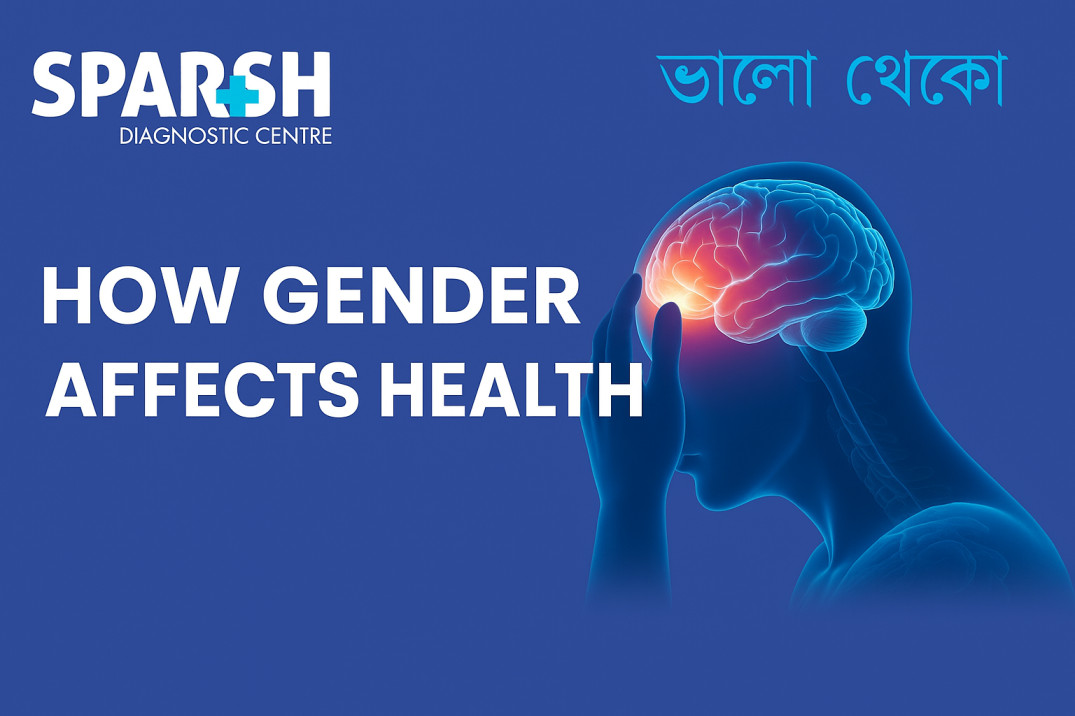Health is not one-size-fits-all. Men and women experience, respond to, and recover from illnesses differently — not just because of biology, but also because of lifestyle, behavior, and social expectations. Gender plays a powerful role in shaping one’s overall health — from the risk of chronic diseases to how likely a person is to seek medical help.
Understanding how gender affects health is essential for both patients and healthcare providers. It helps tailor diagnosis, treatment, and preventive care to meet the unique needs of every individual.
The Biological Basis: How Sex Differences Affect Health
While the terms sex and gender are often used interchangeably, they have distinct meanings.
Sex refers to biological differences — chromosomes, hormones, and reproductive anatomy.
Gender involves social roles, identity, and behavior shaped by culture and society.
These biological differences can directly impact disease patterns and health outcomes.
Hormonal Influence
Hormones such as estrogen, progesterone, and testosterone have significant effects on various body systems.
Estrogen protects women from heart disease before menopause by maintaining good cholesterol levels and healthy blood vessels.
Testosterone, in men, promotes muscle growth but may increase risk-taking behavior, indirectly affecting health outcomes.
Hormonal fluctuations also influence immune function, metabolism, and even pain perception.
2 Genetic Factors
Certain diseases are sex-linked, meaning they are tied to the X or Y chromosomes. For example:
Hemophilia and Duchenne muscular dystrophy occur more commonly in males.
Autoimmune diseases such as lupus and multiple sclerosis are far more common in females.
These genetic differences influence not only disease prevalence but also how the body responds to medications.
3 Body Composition and Metabolism
Men generally have higher muscle mass and metabolic rates, while women have higher body fat percentages essential for reproductive health. These differences affect drug absorption, energy requirements, and even vulnerability to certain conditions like osteoporosis and cardiovascular disease.
Gender and Disease Patterns
Gender affects what diseases people get, how they present, and how they are treated.
Cardiovascular Disease
Men tend to develop heart disease earlier, often linked to higher rates of smoking, high blood pressure, and cholesterol.
Women, on the other hand, are more likely to develop heart disease after menopause, when protective estrogen levels drop.
However, symptoms of heart attacks in women often differ — they may experience fatigue, nausea, or back pain instead of classic chest pain, leading to underdiagnosis.
Cancer
Breast and cervical cancers are leading causes of cancer deaths in women.
Prostate and lung cancers are major concerns for men.
Gender also affects screening behaviors — men are less likely to undergo routine check-ups, while women more frequently participate in preventive screenings.
Mental Health Disorders
Mental health is one of the most striking areas where gender differences appear.
Depression and anxiety are twice as common in women, partly due to hormonal influences and social pressures.
Men, however, have higher rates of substance abuse and suicide, possibly due to stigma and reluctance to seek help.
Societal expectations of masculinity often discourage emotional expression, leading to suppressed mental health issues.
Autoimmune Diseases
Women account for nearly 80% of autoimmune disease cases, including rheumatoid arthritis, Hashimoto’s thyroiditis, and systemic lupus erythematosus. Researchers believe estrogen plays a role in the heightened immune response seen in females.
Infectious Diseases
Men and women respond differently to infections and vaccines:
Women typically mount stronger immune responses, which helps fight infections better.
However, this also increases their risk of autoimmune reactions.
Men often experience more severe outcomes from infections like COVID-19, likely due to hormonal and immune differences.
Behavioral and Lifestyle Factors
Gender norms also shape behaviors that directly influence health.
Healthcare-Seeking Behavior
Women are more likely to seek preventive care, visit doctors regularly, and follow medical advice.
Men often delay seeking help, leading to late diagnosis and poorer outcomes.
This “tough it out” attitude among men contributes to higher mortality from preventable conditions.
Risk-Taking Behavior
Men are statistically more prone to risky behaviors — smoking, excessive drinking, and unsafe driving — leading to higher rates of accidents, injuries, and chronic diseases like liver cirrhosis or lung cancer.
Diet and Physical Activity
Cultural and social expectations can influence eating habits and exercise routines:
Men generally consume more calories and red meat.
Women may face societal pressure to diet or maintain certain body images, sometimes leading to eating disorders like anorexia or bulimia.
Reproductive Health and Gender Roles
Pregnancy, childbirth, and menopause are uniquely female experiences that come with distinct health challenges.
Meanwhile, men’s reproductive health concerns such as low testosterone, prostate enlargement, or erectile dysfunction are often stigmatized, leading to underreporting.
The Role of Social Determinants
Gender does not exist in isolation — it intersects with income, education, occupation, and access to healthcare.
Access to Healthcare
Globally, women often face barriers to healthcare access due to economic dependence, lack of autonomy, or cultural restrictions.
Conversely, men may avoid care due to perceptions that seeking help is a “sign of weakness.”
Workplace Hazards
Men dominate industries with higher occupational risks, such as construction and mining. Women, especially in healthcare and caregiving roles, face ergonomic strains, stress, and exposure to infectious diseases.
Gender-Based Violence
Violence disproportionately affects women and has long-term effects on physical and mental health, including chronic pain, PTSD, and depression.
Health Education and Awareness
In many societies, women have limited access to education, affecting their understanding of health and preventive care. This increases the burden of preventable diseases.
Gender and Medical Research: The Knowledge Gap
Historically, medical research has been male-biased.
For decades, clinical trials primarily included men, assuming that results would apply to both sexes. This has led to gaps in understanding how diseases and drugs affect women differently.
Women metabolize certain drugs, like sleep aids and antidepressants, at different rates.
Symptoms of diseases such as heart attack and stroke can differ between genders, yet clinical training often focuses on male presentations.
Recognizing and addressing these gaps is crucial for equitable healthcare.
Toward Gender-Sensitive Healthcare
Modern medicine is increasingly recognizing the importance of gender-sensitive healthcare, which considers biological and social factors in diagnosis and treatment.
Personalized Medicine
Personalized or precision medicine aims to tailor treatments based on an individual’s genetics, hormones, and lifestyle — which naturally includes gender-based differences.
Gender-Inclusive Research
Encouraging equal representation in medical trials ensures that findings are applicable to everyone. This also helps identify gender-specific side effects and treatment responses.
Education and Awareness
Healthcare providers should be trained to recognize gender differences in symptom presentation, disease risk, and communication styles.
Similarly, patient education should promote gender-specific preventive screenings — like mammograms/USG of breasts, Pap smears, and prostate exams.
The Future: Closing the Gender Health Gap
Bridging the gender gap in health requires a multidimensional approach:
Policy reforms ensuring gender equity in healthcare access.
Community outreach programs to improve awareness among both men and women.
Workplace wellness initiatives addressing gender-specific risks.
Research funding dedicated to exploring sex-based biological differences.
As healthcare becomes more inclusive, understanding gender dynamics will be central to improving health outcomes for everyone.
Frequently Asked Questions (FAQs)
1. Why does gender affect health?
Gender influences health due to both biological differences (like hormones and chromosomes) and social factors (such as roles, behaviors, and access to care). These differences shape disease risk, symptom presentation, and healthcare utilization.
2. Are men or women healthier overall?
There’s no simple answer. Women tend to live longer but experience more chronic illnesses. Men often face higher rates of early death due to heart disease, accidents, and risk-taking behavior.
3. How does gender impact mental health?
Women are more prone to anxiety and depression, while men have higher rates of suicide and substance abuse. Social stigma often prevents men from seeking mental health support.
4. What role do hormones play in health differences?
Hormones like estrogen and testosterone influence metabolism, immune function, and even mood. Estrogen offers cardiovascular protection, while testosterone can affect aggression and muscle mass.
5. Why is gender-sensitive healthcare important?
It ensures that diagnoses and treatments are tailored to the unique biological and social needs of each gender — improving accuracy, effectiveness, and overall patient outcomes.
Gender affects health in profound ways — biologically, behaviorally, and socially. Recognizing these differences is key to achieving better, more equitable healthcare for everyone. Both men and women benefit when medical care is informed by gender-specific research and delivered with sensitivity and understanding.
At Sparsh Diagnostic Centre, we believe in personalized, patient-centered care that recognizes every individual’s unique health needs. Our expert team ensures early detection, accurate diagnosis, and comprehensive management — for all genders and every stage of life.
#BhaloTheko
Disclaimer:
No content on this site, regardless of date, should ever be used as a substitute for direct medical advice from your doctor or other qualified clinician.

![]()





